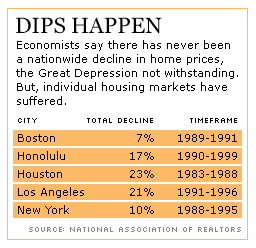NEW YORK (Money Magazine) - Forget book clubs and poker nights. America's property craze has spawned a new social network: The real estate investment club.
Across the country, dentists, retirees, janitors and even teenagers gather each week in hotels, buffet halls, synagogues and the like to sniff for scuttlebutt and attend get-rich seminars with titillating titles like "Turn an Ugly House into a Pot of Gold" and "Exploding Profits Through Bankruptcies."
California now has more than 40 such clubs, Florida 50. The Georgia Real Estate Investor Association has grown so large -- its main monthly meeting can draw 1,000 -- the group recently bought a building to host an almost daily schedule of confabs.
In Texas, Randy Steadham, a former oil services exec who is president of the Realty Investment Club of Houston (none too subtle acronym: RICH), says his membership has quadrupled since 2001, to 2,100 people.
"I for one," he drawls, "have pulled all my money out of the stock market and put it into real estate."
Hmm. Substitute the words tech stocks for real estate, margin loan for interest-only mortgage, and the housing boom takes on an ominously familiar tone.
The question isn't whether home values across the country will vaporize all at once, as the Nasdaq did. (They won't.)
It's whether too many people are acting as if nothing bad could happen.
Let's be clear: No one knows when home prices will top out in your area.
History suggests, however, that it'll happen not long after homeowners and buyers reach maximum certainty that they've discovered the fail-safe key to riches.
Considerable anecdotal evidence suggests that fateful time may be near.
Consider:
Owners have unrealistic expectations
Last year, 34 metro areas (15 of them in California) showed double-digit price spikes. Many homeowners seem to expect these kind of gains forever.
A survey of nearly 700 owners in Boston, Milwaukee, San Francisco and California's Orange County by Karl Case of Wellesley College and Robert Shiller of Yale finds that the average person in counting on double-digit growth each year for the next 10 years.
Reality check: Over the long run, housing has risen at around one percentage point a year ahead of inflation. That implies more T-bill-like returns in the future.
Housing is incredibly unaffordable

The number of people with million-dollar homes has grown so quickly the Census Bureau has had to add a new upper-end entry to keep pace. Based on a comparison of median home values (nationwide: $191,300) with median incomes, the U.S. market is more expensive than at any point since World War II.
The median home now sells for more than twice what its occupants make; in some areas the price-to-income ratio is double that or more.
In Boston, the median home sells for 3.3 times median income. In San Diego it's 5.2 times and in San Francisco 4.2 times.
If interest rates rise, as they're expected to do, housing will get less affordable still.
Signs of a slowdown are already emerging
Sales of existing homes fell 3 percent in July from June's record pace.
At the current rate of sales in Orange Country, there are now five months' worth of homes on the market, compared with just one month's worth earlier this year, said one agent.
And in Las Vegas, where prices soared 52 percent in 12 months ended June 30 (the greatest one-year jump for any metro area ever), sales have dried up faster than a desert oasis.
"Two months ago I couldn't keep a listing for a day," said Prudential Americana agent Leslie Carver. "Now no one has looked at some of these in weeks."
Housing debt is getting worse
With $6.8 trillion in mortgage debt at year-end, banks now own 45 percent of our homes, the highest level on record.
And although interest rates have begun to climb, borrowers continue to embrace adjustable-rate mortgages (ARMs), which will constitute an estimated 32 of mortgages financed this year, versus 19 percent in 2003.
In hyper spots, like California and the Northeast, people looking for the lowest monthly nut are increasingly betting on a dubious gimmick: the interest-only ARM, in which your entire monthly payment goes toward interest and zippo pares down principal.
"Your essentially your renting from your bank with an option to buy," warns Northern Trust chief economist Paul Kasriel.
If you're a homeowner who has locked in a comfortable fixed-rate mortgage, you can probably weather any downturn with little worry.
But this is no time for a big cash out refi or home equity loan. They will cut away your equity margin of safety and, if you're unlucky in a real estate crunch, leave you owing more than your home is worth.
A common sense credo for deciding how much to cash out: never take more than the IRS will let you deduct. (The most you can deduct is the interest paid on the amount you borrowed to buy or improve your home plus the interest on as much as $100,000.)
A second strategy to consider: downsizing. That's not to suggest you try to time the market by moving into a rental to wait out a storm that may never strike.
But if you're already thinking about trading in Casa Grande for cottage living, there's no point in trying to squeeze out the last iota of appreciation.
As economists like to say, if something can't go on forever, it won't.

|